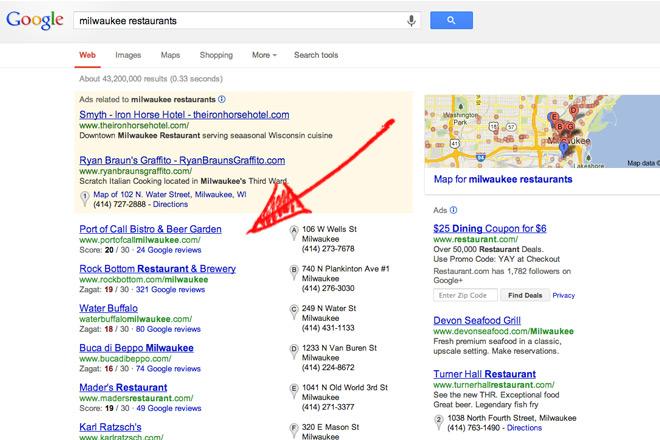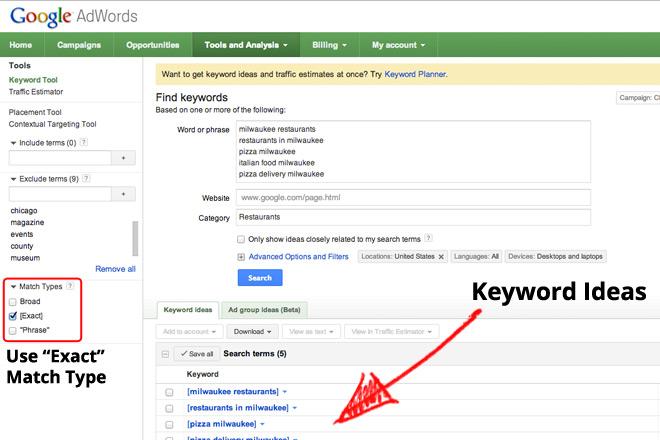5 Local SEO Tips For Restaurants
This is a guest article by Jon Hainstock, the co-founder of ZoomShift, employee scheduling software made simple and Tailwind Creative. Connect with Jon on Twitter @jonhainstock.
If you’re having difficulty navigating the topic of SEO (search engine optimization), you’re not alone. You have probably received at least one scammy email in the past month about how to increase your search engine rankings. These emails usually promise to get you to the top of page 1 in a week for the low price of $100! Don’t take the bait, there’s a better way.
In this post I’ll give you 5 quick and dirty tips on how you can increase your local SEO efforts.
1. Claim Your Google Plus Page
When you search for restaurants in your area, you will see Google plus listings at the top of the results (see image below).

To claim your Google plus page, do a quick search for your restaurant from Google Maps to see if Google has already catalogued your restaurant. If you find a Google plus listing for your restaurant, click on ‘Manage This Page’ on the bottom right of the page. You will be asked to sign in with a Google account. If you don’t have a Google account you can set one up easily for free.
Once you have signed in, Google will ask you to verify that you are the business owner by either calling the phone number they have on file or by sending a postcard to the address they have on file with a code you will need to enter for confirmation. I have found that verifying your address by postcard is the best way to ensure you have the ability to manage your Google plus page.
If you can’t find a Google plus page for your restaurant you may need to set one up. To set up your Google plus page, go to google.com/places and click on ‘Get Started For Free’.
2. Fill Out Google Plus Page Completely And Accurately
Once you have claimed or created your Google plus page you will want to make sure all of the information is completely filled out and there are no duplicate listings. If you find duplicate listings that you do not own, you will want to report them using the instructions found on Google’s support.
Take the time to make sure that your restaurant name, address, phone number, and website are correct. I’d recommend doing a Google search on your restaurant’s address and use the exact format that Google provides.
Make sure you have added categories that best describe your restaurant. Add photos, hours of operation and any additional details that would be helpful to customers.
3. Claim + Complete Local Business Directory (Citation) Listings
Claiming and removing duplicate business directory listings sends signals to search engines, helping them increase the degree of certainty they have about your business’ contact information and categorization. Here is a list of the citations that I have found are valuable for restaurants to claim.
- Bing Places
- Yelp
- Superpages
- City Search
- Urban Spoon
- OpenTable
- Yellow Pages
- Angi
- Express Update USA (formally infoUSA)
- Yahoo Local
- Trip Advisor
- Merchant Circle
- Dex Knows
- Insider Pages
- Localeze
- Shop City
- Judy’s Book
- Yellow Bot
- Kudzo
If you have more money than time, I’d recommend submitting to multiple citations at the same time with Yext. Yext will submit to listings for you and let you know the status for each citation. You can always track this on your own in an excel spreadsheet if you cannot afford this service.
4. Do Keyword Research
Use the Google Adwords Keyword Tool to learn how people are searching. Try entering 5-10 queries you think would be used to find a restaurant in your category and region.
For example:
- “your city restaurants”
- “your food category your city”
- “restaurants in your city”
The Google Adwords Keyword Tool was designed to help people buy ads for keywords and will show you the number of times a keyword is searched for every month with the keyword’s overall competition. Higher competition keywords are more expensive to rank for in paid results, and in general, harder to rank for in organic results as well. The search numbers are not completely accurate, but they can help you determine what keywords have the most opportunity in your region.
The Google Adwords Keyword Tool also gives you keyword ideas. Often times this will reveal opportunities to target multiple keywords on your site.
Pro Tips:
- Use ‘Exact’ match type when searching for keywords so you can see the volume for a specific query.
- Select ‘Local’ so you are only looking at results for the U.S.
- Define the category to limit the span of keyword ideas.
- Use ‘Include terms’ or ‘Exclude terms’ to narrow your keyword ideas

5. Optimize Your Homepage For A Specific Keyword
When search engines crawl and store your website, they don’t see everything the same way we do. Instead of seeing pretty pages and stunning slideshows, search engines see raw HTML (the stuff that Restaurant Engine does behind the scenes to make your site look good).
Search engines break down the structure of the HTML to determine what the page is about, and use cues in the content to help them determine if your pages should be served to a user that is searching for “restaurants in milwaukee”, as an example. Optimizing the content on the site is often overlooked, but it shouldn’t be because you have direct control over the content.
After you have done some keyword research, and have found the keyword with the most opportunity you will want to optimize your homepage for that query.
You’ll need to use a tool to analyze the raw HTML of your page for a specific keyword. I’d highly recommend using Juxseo, a free tool that gives you a clear checklist of the things you need to do to optimize your on page content for a specific keyword. If your site is built on WordPress, you can use the Yoast SEO plugin to check and optimize your content for specific keywords.
Avoid optimizing for more than 1 or 2 keywords on any page as this will boost your chances of ranking for the terms you are going after.
I hope this short guide has helped give you actionable things you can do to improve your local SEO. If you have any questions please comment below!

Great local SEO tips my fellow Milwaukeean 🙂
Restaurants need to take advantage of all of the marketing tools available to them. An online presence is a must. Most people decide on what restaurant to visit by searching locally on their mobile device. I use this local business information for my blog: https://www.venuepick.com/blog
Wow, this is great information.
SEO Internet marketing is very useful, good features, taking the post, thanks. درب اتوماتیک
This is very useful, I thank you. نمای کامپوزیت
Very useful local SEO tips! With the recent addition of Google’s 2 new interface changes, (http://www.chatmeter.com/google-local-changes-requiring-greater-review-management/) local SEO is becoming more important than ever, especially for restaurants. Thanks for sharing your insight.
Good article and spot on. For most restaurant owners its hard to take the time to do things like this. If you want to partner with a company that focuses on your local search strategy call us at RevLocal. We are the company with no contracts. 404-987-0310 or email me at pkane@revlocal.com